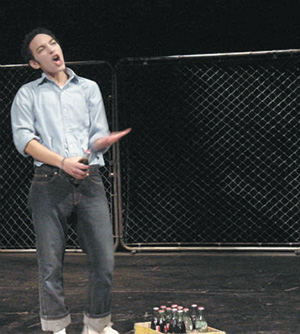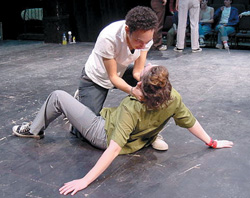|
Music, War, Prejudice
 If you thought “West Side Story” was
a love story with cute songs, think again, says
Tamara Roberts ’00. She and
colleagues in Northwestern’s performance studies
Ph.D. program recently staged a parody of the classic
story using an all-female cast (except for one male
playing a drag queen). Roberts served as music director
and played the role of Tony. James Hayford
’00 provided sound design.
If you thought “West Side Story” was
a love story with cute songs, think again, says
Tamara Roberts ’00. She and
colleagues in Northwestern’s performance studies
Ph.D. program recently staged a parody of the classic
story using an all-female cast (except for one male
playing a drag queen). Roberts served as music director
and played the role of Tony. James Hayford
’00 provided sound design.
“We wanted to critique
the race and gender issues in the film,” says
Roberts. “The text deals with whites and Puerto
Ricans, but the film cast mostly white actors in
brownface for the Latinos. We also looked at some
homoerotic elements — the physicality of Tony
and Riff, the way they gaze into each other’s
eyes. We disrupted the audience’s experience
of the film, making them look at the way race and
gender are presented, as well as enjoying the music
and dancing.”
And, says Roberts, looking at how music helps construct
categories like race and gender ties right into
her dissertation-in-progress, which discusses how
music helps support U.S. national identities and
looks specifically at the role of sound in warfare.
 “My
dissertation was sparked by a performance I did
here at Northwestern based on the law of entrainment,
which says that if two rhythms are nearly the same
and their sources are in close proximity, they will
begin to fall in sync. It’s like someone listening
to a piece of music: soon their heartbeats can start
to coincide with the pulse of the music. “My
dissertation was sparked by a performance I did
here at Northwestern based on the law of entrainment,
which says that if two rhythms are nearly the same
and their sources are in close proximity, they will
begin to fall in sync. It’s like someone listening
to a piece of music: soon their heartbeats can start
to coincide with the pulse of the music.
“I’ve used this idea to explore how
music has been used in warfare, like to keep armies
marching together, but also how it could be used
to join people in peaceful synchrony. I’m
really interested in the ways music serves as a
mediator between state and citizen, how the U.S.
government has used music to establish certain notions
about citizenship, and how musical performance helps
bind us as citizens, through ritual contexts like
singing the ‘Star-Spangled Banner.’
I also look at how intercultural performance can
be a political tool that
challenges a more homogenized image of the nation/state.
While state music can help delineate who is an insider,
who is a criminal, and who is a foreigner, individuals’
performances blur these lines.”
| Professor
Tom Lindblade recalls Tamara Roberts as highly
motivated: "Did she ever grab the brass ring!
I have never had a student who used the opportunities
of Colorado College to better advantage. - "What
makes Tamara different is the combination of
her intellect and her compassion, and she found
that in the theater. Her first class with me
was on Thornton Wilder, and she was a little
nervous: new territory. But she was bitten by
Day 3 - moved by his essays on Americanism,
dazzled by his theatrics, seduced by his mind.
I'd give my eye teeth to have 100 students like
Tamara Roberts." |
A double drama and music major at CC, Roberts says
she first realized the potential of playing with
musical and theatrical conventions when she took
a Thornton Wilder class from Professor Tom Lindblade.
“I was impressed by Tom’s ability to
engage everyone with this playwright,” she
says. Roberts says Lindblade “is the sole
reason I’m in grad school right now. He helped
me seize so many wonderful opportunities while at
CC, and introduced me to the importance of both
theoretical study and practical work. Tom and the
other drama and music faculty that supported me
are an incredible treasure.”
– Anne Christensen
|